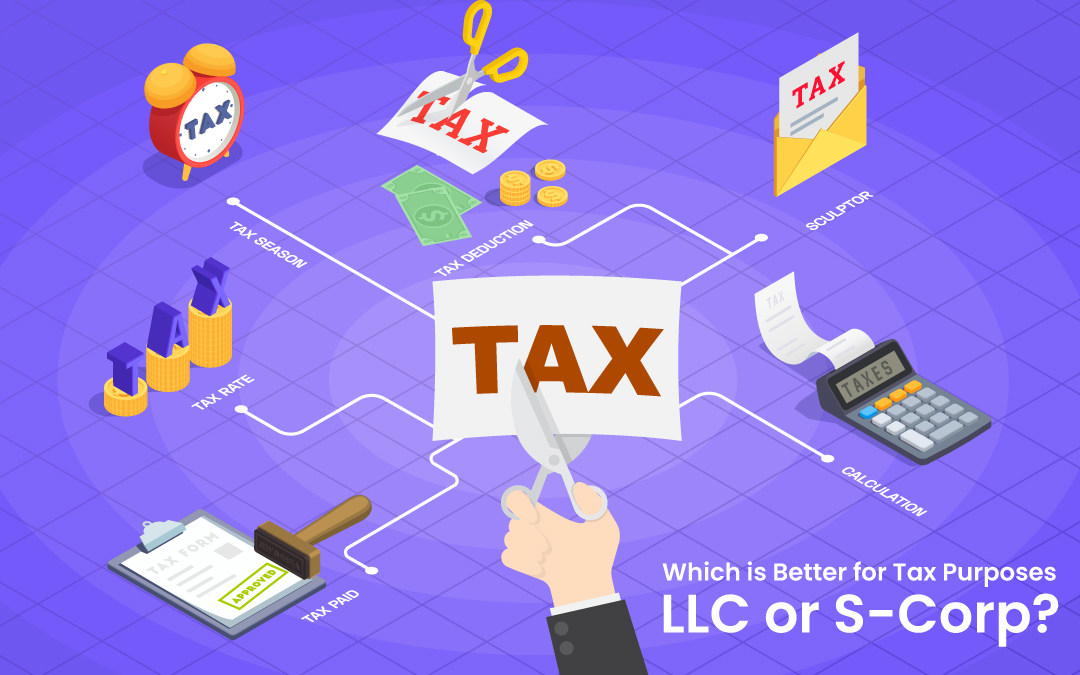
Choosing between a Limited Liability Company (LLC) and an S Corporation (S Corp) for tax purposes is a significant decision for business owners. Both structures offer distinct advantages and disadvantages, which can impact your tax obligations and overall business strategy. This guide will help you understand the key differences between an LLC and an S-Corp, and how to use an S-Corp vs. LLC tax calculator to make an informed choice.
Understanding LLCs and S-Corps
Limited Liability Company (LLC):
An LLC is a flexible business structure that offers limited liability protection to its owners, known as members. This means that the members are not personally liable for the company's debts or liabilities. LLCs can have one or more members, and there are fewer restrictions on ownership compared to an S-Corp.
S Corporation (S-Corp):
An S-Corp is a special type of corporation that elects to pass corporate income, losses, deductions, and credits through to their shareholders for federal tax purposes. Shareholders of S-Corps report the income and losses on their personal tax returns, which helps avoid double taxation on corporate income. However, there are stricter requirements for ownership, such as a limit of 100 shareholders and the restriction that shareholders must be U.S. citizens or residents. When comparing business structures, using an S Corp vs LLC tax calculator can be helpful to determine the most tax-efficient option for your specific situation.
Tax Considerations
Taxation of LLCs:
- Default Tax Treatment: By default, a single-member LLC is treated as a sole proprietorship, and a multi-member LLC is treated as a partnership. In both cases, the LLC itself does not pay taxes. Instead, profits and losses are passed through to the members, who report them on their personal tax returns.
- Self-Employment Taxes: LLC members must pay self-employment taxes on their share of the profits. This includes Social Security and Medicare taxes, which can add up to a significant amount.
Taxation of S-Corps:
- Pass-Through Taxation: Like LLCs, S-Corps benefit from pass-through taxation. However, S-Corp shareholders can be employees and pay themselves a reasonable salary, which is subject to payroll taxes. The remaining profits can be distributed as dividends, which are not subject to self-employment taxes.
- Payroll Taxes: S-Corp shareholders can potentially reduce their overall tax burden by minimizing the portion of profits subject to payroll taxes. However, the IRS requires that S-Corp shareholders be paid a reasonable salary for the work they perform.
Using an S-Corp vs LLC Tax Calculator
Deciding between an LLC and an S-Corp can be complex, and using an S Corp vs LLC tax calculator can help simplify the process. These calculators allow you to input your business income, expenses, and other relevant details to estimate your tax obligations under each structure. By comparing the results, you can determine which option may provide better tax savings for your specific situation.
Filing for Corporation
When you decide to form an S-Corp, you must file for corporation status with the IRS by submitting Form 2553. The deadline for filing is within two months and 15 days after the beginning of the tax year in which you want the election to take effect. Additionally, your corporation must meet the requirements to qualify as an S-Corp, such as having eligible shareholders and only one class of stock.
For those considering professional help in setting up their business structure, companies like MyCorporation offer services to assist with the formation and filing process. This can ensure that all legal and tax-related requirements are met efficiently.
Key Factors to Consider
The following factors must be kept in mind while making the decision:
- Ownership Structure: If you plan to have more than 100 shareholders or include non-U.S. citizens, an LLC might be the better choice due to its fewer restrictions on ownership.
- Self-Employment Taxes: If you aim to minimize self-employment taxes, an S-Corp may offer an advantage through the ability to pay a reasonable salary and distribute remaining profits as dividends.
- Flexibility and Simplicity: LLCs offer more flexibility in management and fewer compliance requirements compared to S-Corps. This can be beneficial for smaller businesses or those seeking a simpler structure.
- Future Goals: Consider your long-term business goals and how the structure you choose now will support those plans. For example, S-Corps may be more appealing to investors due to the structured corporate framework.
Conclusion
Choosing between an LLC and an S-Corp for tax purposes depends on various factors, including your business's size, income, ownership structure, and future goals. Using tools like an S Corp vs LLC tax calculator can provide valuable insights into the tax implications of each structure, helping you make an informed decision. While LLCs offer flexibility and simplicity, S-Corps can provide significant tax advantages by reducing self-employment taxes.
Ultimately, consulting with a tax professional and considering your unique business needs will guide you to the best choice. Whether you decide to file for corporation status or stick with an LLC, understanding these differences is crucial for optimizing your tax strategy and supporting your business's growth.
Share this post
Leave a comment
All comments are moderated. Spammy and bot submitted comments are deleted. Please submit the comments that are helpful to others, and we'll approve your comments. A comment that includes outbound link will only be approved if the content is relevant to the topic, and has some value to our readers.

Comments (0)
No comment